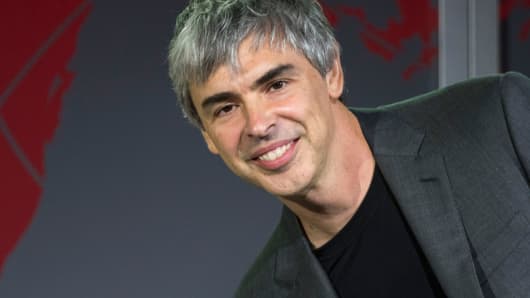Alphabet, Google's parent company, is known for its aggressive approach to hiring top computer engineers. Now, it has its sights set on poaching top talent from life sciences and health care.
Google co-founders Sergey Brin and Larry Page have stressed in the past that Google will not become a health care company, in part because of the regulatory complexity associated with the field. But today, three of Alphabet's "Other Bets" are focused on the $3 trillion sector. Both of its venture arms, GV (formerly Google Ventures) and CapitalG (formerly Google Capital) are also investing in the space.
Sidewalk Labs is perhaps the most surprising. The Alphabet subsidiary, which aims to use technology to solve "big urban problems," this month posted new job listings for health care positions, including a engineers, a chief health officer (a primary care physician) and a head of community health for an effort called "Care Labs." Not much has been shared publicly about Care Labs, aside from a Medium post that spells out a big vision to imagine "how care delivery might look in the digital era."
Alphabet's Calico, a drug development shop focused on longevity, and Verily, which was Google's life sciences arm, and have also hired heavily from life sciences and health care.
The company's star talent in the field so far includes Arthur D. Levinson, former CEO of Genentech and an Apple chairman, who is Calico's CEO; Tom Insel, the former head of the National Institute of Mental Health, who is at Verily; and Jessica Mega, a star cardiologist at Harvard Medical School and Brigham and Women's Hospital, now at Verily.
Alphabet is currently looking to hire computational biologists, robotics experts and top academic researchers, which are among the most competitive positions to hire.
"Of all the tech companies, Alphabet has been most prominent in establishing new operations in life sciences," says Cynthia Yee, a principal at health-focused fund Windham Venture Partners.
"In the short-term, we'll see some biotech and health startups struggle to match the salary and compensation that an established company like Alphabet can offer," Yee said.
She said several of the startups in her firm's portfolio have already lost key talent to Alphabet, but she declined to provide specifics. It might benefit the industry in the long-run, she says, if Alphabet steps up to acquire life sciences startups or seeks out partnerships. Verily has already announced a string of partnerships with industry giants, including GlaxoSmithKline, Johnson & Johnson, and Sanofi.
Steve Kraus, a biotech investor at Bessemer Venture Partners says the life sciences industry will get more nervous if Alphabet starts recruiting heavily in their backyard. Alphabet's companies are headquartered in Silicon Valley, rather than in Boston and Cambridge where life sciences companies have deep connections to the science and engineering departments at Harvard and MIT. "I worry about the war for talent," he says. "Alphabet will make a real go of it, but if there's power in a cluster."
Others, like biotech executive and geneticist Sabah Oney from start-up Alector believe that Alphabet's interest in the space is a "net positive" overall. "I've seen so many smart scientists get offers to consult or join Google for real money," he says. "Scientists are so underpaid and undervalued, so the competition can only be a good thing."

